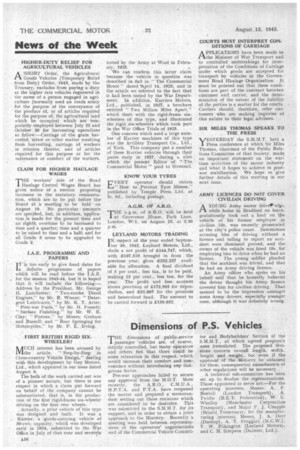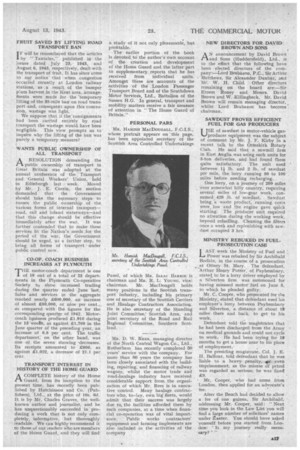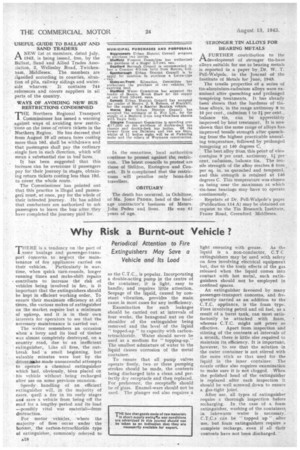News of the Week
Page 18

Page 19

Page 20

If you've noticed an error in this article please click here to report it so we can fix it.
HIGHER-DUTY RELIEF FOR AGRICULTURAL VEHICLES
ASHORT Order, the Agricultural Goods Vehicles (Temporary Relief from Duty) Order, 1943, made by the Treasury, excludes from paying a duty at the higher rate vehicles registered in the name of a person engaged in agriculture (normally used on roads solely for the purpose of the conveyance 'of the produce of, or of articles required for the purpose of, the agricultural land which he occupies) whiph are temporarily employed between July 22 and October 30 for harvesting operations as follow:—Carriage of the grain harvested, straw or other matter resulting from harvesting, carriage of workers in relation thereto, and of articles required for this purpose or for the sustenance or comfort of the workers.
CLAIM FOR HIGHER HAULAGE WAGES THE workers' side of the Road
Haulage Central Wages Board has given notice of a motion proposing increases • in the statutory remuneration, which are to be put before the Board at a meeting to be held on August 19. No particular. amounts are specified, but, in addition, application is made for the, present time and an eighth overtime to be increased to time and a quarter; time and a quarter to be raised to time and a half; and for all Grade 3 areas to be upgraded to Grade 2.
I.A.E. PROGRAMME AND PAPERS
I T ig too early to give fixed dates for a definite programme of papers which will be read before the I.A.E. for the session 1943-44, but it is hoped that it will include the following:— Address by the President, Mr. George H. Lanchester; " Two-stroke, Diesel Engines," by Mr. R. Wisner; " Detergent Lubricants,'' by Mr. K. T. Arter; " Post-war Fuels," by Mr. H. Fossett; "Surface Finishing," by Mr. W. E. Clay; " Pistons." by Messrs. Graham and Russell; and " Rear Springing for Motorcycles," by Mr. P. E. Irving.
FIRST BRITISH RIGID SIXWHEELER? .
MAUCH interest has been aroused by IV/the article, " Step-by-Step in Cross-country Vehicle Design," dealing with this development by Guy Motors, Ltd., which appeared in our issue dated August 6.
The bulk of the work carried out was of a pioneer nature, but there is one respect in which a claim put forward on behalf of the company cannot be substantiated, that is, in the production of the first rigid-frame six-wheeler driving on the four rear wheels.
; Actually, a prior vehicle of this type was designed and built. It was a Harrier, a goods-carrying 'vehicle of 30-cwt. capacity, which was developed early in 1924, submitted to the War Office in July of that year and severely tested by the Army at Wool in February, 1925.
We can confirm this latter claim because the vehicle in question was described in full in " The Commercial Motor" dated 'April 14, 1925, and in the article we referred to the fact that it had been tested by the War Department. la addition, Harriers Motors, Ltd., published, in 1927, a brochure entitled " Two Million Miles Apart," which dealt with the rigid-frame sixwheelers of this type, and illustrated the rigid six-wheelers which took part in the War Office Trials Of 1925.,
One concern which used a large number of Karrier machines of this type was the Artillery Transport Co., Ltd., of York. This company put a number of these Harrier vehicles through their paces early in 1927, during a visit which the present Editor of "The Commercial Motor " paid to Strensall.
KNOW YOUR TYRES VERY operator should obtain
• " How to ;Prevent Tyre Misuse," published by 'Temple Press Ltd. at 2s. Sd., including postage.
A.G.M. OF A.-R.O.
THE a.g.m. of A.R.O. Will be ;held at Grosvenor .House, Park Lane, London, \V.1, on August 23, at 2.39 p.m.
LEYLAND MOTORS TRADING I N. respect of the year endedSeptem ber 30, 1942, Leland' Motors, Ltd., n3acie a net profit of 2144,747, which, with 2107,510 brought in from the previous year, gives 2252,257 available for allocation. A final dividend of 5 per cent., less -tax, is to be paid, making 15 per cent., less tax, for the year. The profit and loss account shows tkovision of 2172,995 for depreciation, and 251,867 for the pensions and benevolent fund. The amount to be carried forward is 2150,632.
COURTS MUST INTERPRET CONDITIONS OF CARRIAGE
APPLICATIONS have been made to the Minister of War Transport and to controlled undertakings for interpretation of the Conditions of Carriage under which goods are accepted for transport by vehicles in the Government Road Haulage Organization. It must be pointed out that these conditions are part of the contract between customer and carrier, and the determination of the extent of the liability of the parties is a matter for the courts.. Carriers should, therefore, refer customers who are making inquiries of this nature to their legal advisers.
SIR MILES THOMAS SPEAKS TO THE PRESS VESTERDAY the S.M.M.T. held a Press conference at which Sir Miles Thomas, chairman of the Public Relations Committee of that Society, made an important statement on the wartime activities of the motor industry and what it hopes to achieve in postwar stabilization. We hope to give further details of this meeting in our next issue.
ARMY LICENCES DO NOT COVER CIVILIAN DRIVING
A VOTING Army motor drive* \yip. I"-L while home in Bradford on leave, gratuitously took out a load on the vehicle of his former employer in civilian life, was recently prosecuted at the city's police court. Summonses accusing him of driving without a licence and failing to report an accident were dismissed proved, and the owner of the vehicle was fined 10s. for employing him to drive when he had no
licence. The young soldier pleaded that the accident was trivial, and that he had an Army driving licence.
An Army officer who spoke on his behalf said that he honestly believed the driver thought his Atmy licence covered him for civilian driving. That seemed to be the impression amongst some Army drivers, especially younger ones, although it was definitely wrong. FRUIT SAVED BY LIFTING ROAD TRANSPORT BAN IT will be remembered that the articles by " Tantalus," published in the issues dated July 23, 1943, anti August 6, 1943. respectively, dealt with the transport of fruit It ha S since come to out notice that• when congestion occurred recently at London railway stations, as ,a result of the bumper p:um harvest in the Kent area, arrangetnents were made for the 'temporary lifting of the 35-mile ban on road transport-and, consequent upon this concession, wastage was light. We suppose that if the:consignments had been carried entirely by road transport the wastage would have been negligible. This view prompts us to inquire why the lifting of the ban was purely a temporary measure?
WANTS PUBLIC OWNE'RSHIP OF ALL TRANSPORT
ARESOLUTION demanding the public ownership of transport in Great Britain was adopted at the annual conference of the Transport and General Workers' Union, held in Edinburgh last week. Moved by Mr. J. E. Corrin, the motion demanded that the Government should take the necessary steps to ensure the public ownership of the, 'various forms of internal transport— road, rail and inland waterways—and that this change should he effective immediately after the war. • It was further contended that to make these services fit the Nation's needs .for the period of the war, the Government should be urged, as a further step, to bring all forms of transport under
public control now. .
CO-OP. COACH BUSINESS _INCREASES AT PLYMOUTH
THE motor-coach department is one of 18 out of a total of 25 departments in the Plymouth Co-operative Society to show increased trading during the quarter ended June last. Sales and services in the aggregate reached nearly 2600,000, an increase of almost 250,000, or nine per cent.„ as compared with the figures for the corresponding quarter of 1942. Motor coach business produced 21,916 during the 13 wean, as against 21,760 in the June quarter of the preceding year, an increase of 8.8 per cent. The traffic department; on the other hand, was one of the seven showing -decreases. Its receipts amounted to 2806, as against 21,022, a decrease of 21.1 per cent.
TRANSPORT INTEREST IN HISTORY OF THE HOME GUARD
A COMPLETE history of the Home CA Guard, from its inception to the present time, has recently been pub:. lished by Hutchinson and Co. (Publishers), Ltd., at the price of 10s. 6d. It is by Mr. Charles Graves, the wellknown author and journalist, and he has unquestionably succeeded in• producing a work that is not only completely informative, but thoroughly readable, We can highly recommend it to those of our readers who are members of the Home Guard, and they will find
a study of it not only pleasurable, but profitable.
The earlier portion of the book is devoted to the author's own account of the creation and development of the Home Guard and the latter part to supplementary reports that he has received from individual wilts. Amongst these are accounts of the activities of the London Passenger Transport Board and of the Southdown Motor Services, Ltd., Battalion of the Sussex H.G. In general, transport and mobility -matters receive a fair measure of attention in "The Home Guard of Britain."
• PERSONAL PARS
MR. HAMISH MACDOUGALL, F.C-.I.S., whose portrait appears on' this page, has been appointed secretary of the Scottish Area Controlled Undertakings
Panel, of which MR. ISAAC gARRIR is chairman and Ma. R. L. YOUNG, vicechairman. Mr. MacDougall holds many positions in the Scottish transport 'industry, including his primary one of secretary of the Scottish Carriers and Haulage Contractors AssociatiouHe is also secretary of the Standing Joint Committee,' Scottish Area, and joint secretary of the Road and Rail Regional Committee, Southern Scotland.
MR. D. W. REES, managing director of the North Central Wagon Co., Ltd., Rotherham, has recently completed 50, years' service with the company. For more than 80 years the company has been closely, associated with the building, repairing, and financing of railway wagons, whilst the motor trade and road-haulage industry have received considerable Support from the organization of which Mr. Rees is in executive control. Many haulage contractors who, to-day, own big fleets, would admit that their success was largely due ta, the facilities afforded them by such companies, at a time when financial co-operation was of vital importance. Public works contractors' equipment and farming implements are also included in the activities of the company
NEW DIRECTORS FOR DAVID' BROWN AND SONS AN announcement by David Brown and Sons (Huddersfield}, Ltd., Is to the effect that the following have been elected directors of the cornpany:—Lord Brabazon, P.C., Sir Arthur Matthews, Sir Alexander Dunbar, and Mr. W. H. Child. • Other directors remaining on the hoard are:—Sir Ernest Roney and Messrs. David Brown and W. Killingbeck. Mr. David Brown will remain managing director, whilst Lord Brabazon has become chairman.
SAWDUST PROVES EFFICIENT FUEL FOR GAS PRODUCERS
USE of sawdust in motor-vehicle gasproducer equipment was the subject of comment by Mr. J. F. Kirby in a recent talk to the Ormskirk Rotary Club-. He said that a sawmill firm in East Anglia was using such units for 5-ton deliveries, and had found them quite satisfactory. The unit used between 11 lb. and 2 lb., of sawdust per mile, the lorry running 80 to 100 miles before needing recharging.
One lorry, on a journey of 209 miles , over somewhat hilly country, requiring several miles of low-gear work, consumed 420 lb. of sawdust. Sawdust being 'a waste product running costs were, low and the engine gave quick starting. The producer unit required no attention during the working week, beyond refuelling. 'Cleaning the filters once a week and replenishing with sawdust occupied 3 hrs.
MINISTRY REBUKED IN FUEL. PROSECUTIONCASE
LAST week the Ministry of Fuel and LA Power was rebuked by Sir Archibald Bodkin, in the course of a prosecution at Ottery St. Mary. The defendant, °Arthur Henry Potter; of Payhembury. stated to be a lorry driver employed by a Silverton firm, was summoned for having misused motor fuel on June 5, to which he pleaded guilty.
Mr, C. Cooper, who prosecuted for the
• Ministry, stated that defendant used his employer's lorry between Paybembury and Silverton, a distance of about 18 miles there and back, to get to his work.
• Defendant told the magistrates that he had been discharge-d from the Army on medical grounds and could not cycle to work. He had been trying for 18 months to get a house near to his place of employment.
The presiding magistrate, Col. J. E. IL Balfour, told defendant that he was liable to a heavy penalty, itor even imprisonment, as the misuse Of petrol was regarded as serious; he was fined R3.
Mr, Cooper, who had come from London, then applied for an advocate's fee.
After the Bench had decided to allow a fee of one: guinea, Sir Archibald, addressing Mr. Cooper, said: " Next time you look in the Law List you will find a large ntmber of solicitors' names under Exeter. You should have asked yourself before you started from London: 'Is my journey really necessary?' " USEFUL GUIDE TO BALLAST AND SAND TRADERS
A ziEw list ot members, dated July, JIM 1943, is being issued, free, by the Ballast. Sand and Allied Trades Assoziation, 2, Wellesley Road, Twickenham, Middlesex. The members are closified according to counties, situation of pits, railway sidings and waterside wharves, It contains 744 references and covers suppliers in all parts of the country.
WAYS OF AVOIDING NEW BUS RESTRICTIONS CONDEMNED THE Northern Regional Transport
Commissioner has issued a warning against ways of avoiding new restrictions on the issue of return tickets in the Northern Region. He has decreed that from August 19 all return fares costing more than 10d. shall be Withdrawn and that passengers shall pay the ordinary single fare in each direction, which will mean a substantial rise in bt.iS fares, It has been suggested that this increase can be overcome if passengers pay for their journey in stages, obtaining return tickets costing less than 10d. to cover the whole route.
The Commissioner has pointed out that this practice is "illegal and passengerS must, at once, pay for the whole of their intended journey. He has added that conductors are authorized to ask passengers to leave the bus alter they . have completed the journey paid for.
In the meantime, local authorities continue to protest against the, restriction. The latest councils to protest are those of Shildon, Easington and Consett. it is complained that -the restrictions will penalize only bona-fide travellers.
OBITUARY
The death has occurred, in Ochiltree, of-Ma. JOHN PEDEN, head of the haulage contractor's business of Messrs. John Peden and Sons. He was 61 years of age.
STRONGER TIN ALLOYS FOR BEARING METALS
A FURTHER contribution to the ridevelopment of stranger tin-base alloys suitable for use as bearing metals is reported in a paper by Dr. W. 1'. 'Pell-Walpole, in the Journal of the Institute of Metals for June, 1943: The tensile properties of a series of tin-aluminiuin-cadmium alloys were examined after quenching and prolonged tempering treatments. It has already been shown that the hardness of tinbase alloys, in the range antimony 9 to 10 per cent., cadmium 1 to 1 per cent., balance tin, can be appreciably improved-by heat treatment. It is now shown that the same range of alloys has improved tensile strength after quenching from the highest practicable annealing temperature, followed by prolonged temp,ering at 140 degrees C.
The best alloy from this point of view contains 9 per cent. antimony, 11 per cent, cadmium, balance tin. The tensile strength of the alloy reaches 6 tons, per sq. in. as quenched and tempered. and this strength is reta,ined at 140 degrees C. This temperature was chosen as being near the maximum at which 'tin-base bearings may have to operate continuously.
Reprints of Dr. Pell-Walpole's paper (Publication 114.A) may be obtained on request to the Tin Research Institute, Fraser Road, Greenford Middlesex.




















































